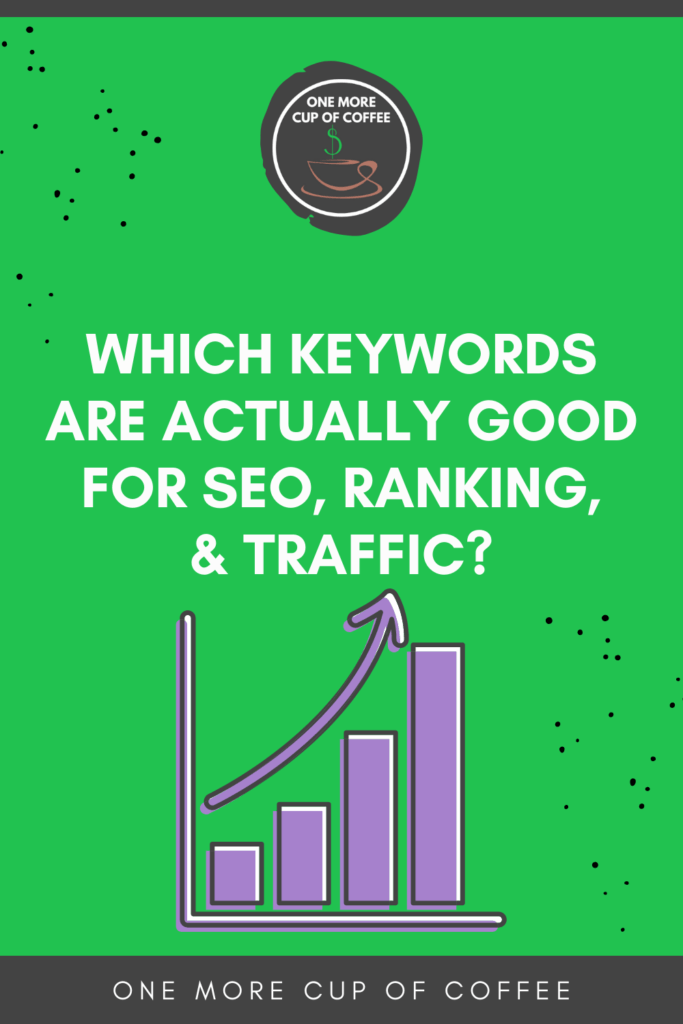
Finding good keywords for my blog has been a game changer for me. Honestly, looking back at earlier years in my business I wasted tons of time and money chasing keywords that were not worth the effort.

Are You Ready To Work Your Ass Off to Earn Your Lifestyle?
Are you tired of the daily grind? With a laptop and an internet connection I built a small website to generate income, and my life completely changed. Let me show you exactly how I’ve been doing it for more than 13 years.
They were either too competitive, or flat out didn’t make sense to write an article about. I didn’t know the difference back then, so I can’t be too mad at myself, but it still sucks to have wasted all that time.
Though I do believe that you just have to kind of get your hands dirty and figure things out by experimenting on your own blog, I’ve taken the time to distill my knowledge and experience from the past 10 years into a few thousand words and a couple hours of video.
I hope this helps you on your affiliate blogging journey!

Get more insights into how I do keyword research with the 4-part video series titled How I Generate Unlimited Content Ideas For Any Website. You’ll get:
• Introduction To Popular Keyword Research Tools
• Social Media Research
• The “Series” Method of Publishing
• How To Not Cannibalize Keywords
Each video is about an hour long, so that’s four hours of content teach you my exact methods of generating content ideas which grew my affiliate blog to over 400,000 page views per month.
>>> Sign Up For $99/month

Get Ranking & Conversions With Proper Keywords
Even with such extensive information, I feel like keywords are something that I see newbies screwing up over and over again. Mostly, I see people making the same mistakes I used to make, so I know they are using the same faulty thought processes that I was using before.
So I wanted to make yet another “how to use keywords” guide, with the focus on producing results. For many of my other SEO posts, I focused on how to use keywords to get ranked. With this post, I want to discuss how to find and analyze keywords. Is this keyword good? Is this keyword too competitive? How can I modify this keyword to be better? Why did this rank and this other one didn’t?
These extra guidelines will help you decide if a keyword is worth your time, or how to tweak it to be more useful.
Oh, and there will be plenty of examples. I hate when tutorials talk about what you should do, without showing exactly what this looks like in the real world. That’s precisely where people get lost – when they try to apply unclear principles to their very clear goals of ranking content in their niche.
Keyword Metrics VS Keyword Usefulness
Firstly, you need to get it out of your head that a keyword tool can guarantee rank. They are just numbers. They are just guidelines. In fact, Google doesn’t even use “keywords” to rank your content. Google’s search engine doesn’t try to identify a keyword then decide if you are worthy of ranking for that phrase.
Google looks at your entire article to figure out what you’re talking about, then matches that with what a person searching for (the intent).
In other words, you could have a very successful website without every spending money on a keyword tool. As long as you have good ideas to write about, you’ll rank and earn money.
The main reason we use keyword tools is to shape what we write about on our niche websites. That includes finding ideas, prioritizing which topics to write more extensively about (higher traffic), and how to phrase our titles/phrases so that we get into low-competition areas of the market.
So, you need to start thinking about how useful a keyword is to your goal instead of just looking at the keyword stats.
Let’s Look At An Example

Someone might see the phrase “wine diet lose weight”, with estimated traffic 128 (medium), to estimated competition 37 (low), and think it’s a great keyword. That’s what the tool says! But think about it – how the hell are you going to make a title out of this that makes sense?
Can A Wine Diet Help You Lose Weight?
Does A Wine Diet Lose Weight For You?
Those titles don’t really make sense. There’s no such thing as a wine diet. This phrase is turning up because people are wondering if they can still drink wine while on a diet and if they’ll still lose weight. That’s the intent of the search. So how can you target the intent? You’ll need to find another phrase.
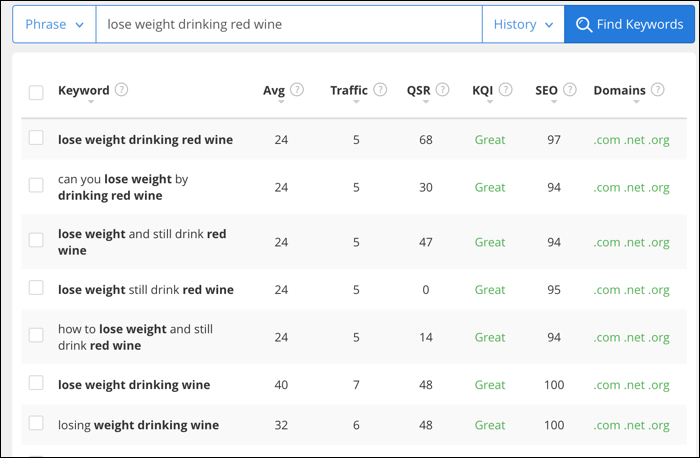
Now we’re getting closer! In the image above, you can see a variety of competition for those phrases, but the traffic is relatively similar, so traffic-wise, that’s what you can expect. The intent of all these searches is people want to lose weight but continue drinking red wine.
The variation in the competition stats is due to the specific phrasing. If the intent of the phrase is the same,I would expect the competition to be similar. If the phrase has different meaning, then we can assume a different set of Google results, thus different competition.
For example, “Lose weight drinking red wine” sounds like someone wants to know if drinking red wine will actually cause them to lose weight. A title could be: Will You Lose Weight Drinking Red Wine With Dinner? This phrase also matches the intent of the next keyword “can you lose weight by drinking red wine”, and further down, “lose weight drinking red wine”. Those are all higher competition phrases in comparison, but still a viable option for an article.
You could talk about antioxidants in wine, heart health, mood benefits, and blood circulation – all bi-products of drinking red wine, so perhaps adding a glass of wine to your evening meal could actually help you lose weight. I could knock out 1200 words on that topic!
By contrast, the other phrases on the page imply that the searcher is on a diet, and they want to know if they can still drink wine while on a diet. Questions to answer could be things like if alcohol messes up your metabolism, how many calories are in a glass of wine, self control issues, carbohydrate count, etc.
I’m not so hot on that 47 competition though, so I’ll conduct another search with word variations.
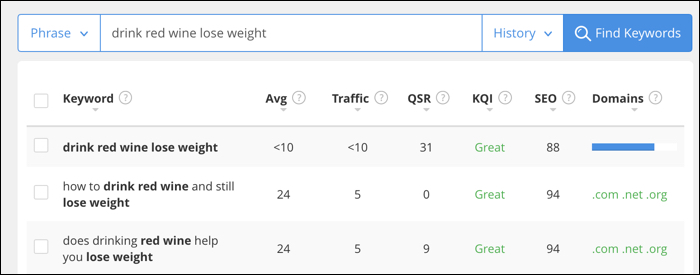
We can see the same search numbers (24), with a zero competition. The intent is the same, so the phrase how to drink red wine and still lose weight is a much more attractive phrase to target so far (we’re not done yet). I also see another potentially better title for our previous example, Does Drinking Red Wine help You Lose Weight.
So now that I have an attractive keyword, I still want to check out the SEPRs (Search Engine Results Pages) to see what’s ranking (competition analysis). Am I sure I want to use this phrase? Is this topic worth writing about?
Well, my prediction was correct. The two different phrases, while similar, turn up different results, each emphasizing the different intent.
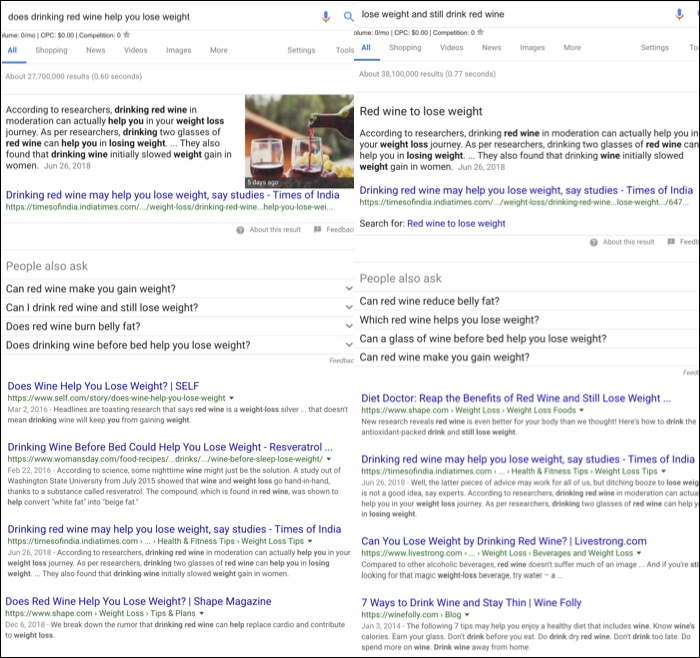
This confirms that we can actually write two completely different articles for each of these keywords.
One more thing I want to draw your attention to. In example #1 (left), you can see the phrase “help you lose weight” in 5/5 search results. This is high competition! All these established websites are targeting your exact keyword.
In example #2 (right), you do not see the exact phrase “lose weight and still drink red wine” used. I can see “still” lose weight at shape.com, and “stay” thin (stay = synonym for still), so there is some phraseology closeness, plus those are strong domains. However, it’s clear that you’ll have a way better chance of ranking for example #2 rather than example #1, so this is the keyword I would aim for.
Example #1 should not be forgotten though. If you look further down on the page 1 of Google results, there are some not-very-authoritative domains and some repeat domains, so you could get on the bottom of page 1 possibly.
Combine These Keywords
A common mistake I see newbies making is to target very similar keywords. In my early stages, I did the same thing. In fact, I went a step further, and created tons of niche websites based on this thought process. At one point I owned about 60 domain names, all with WordPress websites installed on the domains, with similar (albeit different) content on them.
I owned domains like
- bestvpnforprivacy.com
- howtobeanonymousonline.com
- bestvpnservices.com
- vpnonlineprivacy.com
- etc
Those were not the actual domains (I don’t remember what they were), but you get the basic idea. EMD (Exact Match Domains) were still very popular back then, so I just bought any decent EMD I could find, then wrote hundreds of articles per month, on basically the same topics, over and over gain.
It actually worked for a short while, and I was ranking multiple domains for the same keywords. This was back in 2010/2011 though. After a few of the big Google updates, the sites tanked and never recovered. I guess Homie don’t play that.
That waste of time still didn’t force me to learn my lesson yet.
At the start of One More Cup of Coffee, I wrote, as well as outsourced, many, many articles using similar keywords.
I’d write something like how to find the best keywords for your seo blog, and then the next day I’d write what are the best keywords for an SEO website.
Not only did those crappy keywords never rank, but I never saw a situation where I ranked for BOTH. I’ve seen the same principle play out with other niche websites as well. That’s why now I make sure to check all similar phrases and shoot for the middle.
Here’s an interesting set of keywords to look at.

You can see that all of the phrases are different. Expected traffic and visits are similar regardless of the phrasing, but the competition score is slightly different.
What keyword is the best?
Firstly, you should look at the only one with the correct grammar: teach your dog to howl.
Looking at all the competition scores, it looks like teach dog howl has the lowest score. Consider though – how many websites are actually going to use that phrase? It doesn’t make sense! All websites will use the correct phrasing, and that’s why there’s more competition for that phrase.
Plus, with Google autocorrect, whether you search for “teach dog how”, or the grammatically correct version, Google will show the same results.
What if it’s not a grammar issue though? Here are two similar keywords, both grammatically correct.
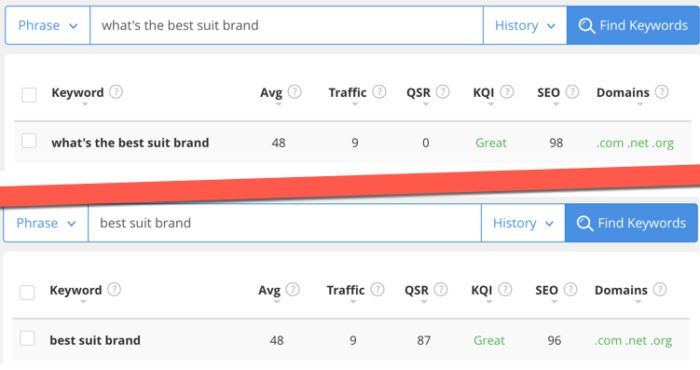
Here we can see that what’s the best suit brand and best suit brand both have the same traffic. They are basically the same keyword with regards to intent. However the competition varies quite a bit! If you think about it though, the competition is probably the same. Google’s going to show the same results no matter what you type because the intent of the search is the same. So what’s your real competition here?
Go with the higher number is what I say. The meaning of the phrases is the same (Actually, I don’t really care about competition that much because I always plan on creating authority websites over a long period of time, but if you are starting a new website competition is more important).
Also, just use logic. Is it possible that no website ever in the history of the internet has written something about the best brands of suits you can buy (As indicated by 0 competition)? It’s highly unlikely, so your competition for this word is going to be 87 (medium).
What should your post title be then?
Again, it depend on the intent. If you just want to cover what the best suit brands are, then you can make your title like what’s the best suit brand in 2019?
But you can also change the intent of the search with titles like what’s the best suit brand for prom, or what’s the best suit brand for big & tall men.
In terms of using the “best suit brand” stand-alone keyword, I wouldn’t even target this broad of a phrase outside of the “what” question shown above. I’d only use this as part of a longer keyword phrase like the best suit brand for hot weather or best suit brand for under $2,000.
The lesson here is that if you find similar keywords, don’t treat them as separate phrases to target. Focus on ideas. If the idea (aka intent) is different, then you can create different content for them. If the idea is basically the same, then pick the one with the higher traffic stats (for more traffic) or lower competition (for easier ranking), depending on your goal.
Avoid These Keywords
As we work towards a more holistic approach to keywords, instead of just looking at what a research tool spits out, there are a couple of types of keywords I recommend staying away from. You can do them if you want, but they’ll probably be a waste of time. Having wasted time myself, I can speak from experience.
“Buy” and “Cheap” Keywords
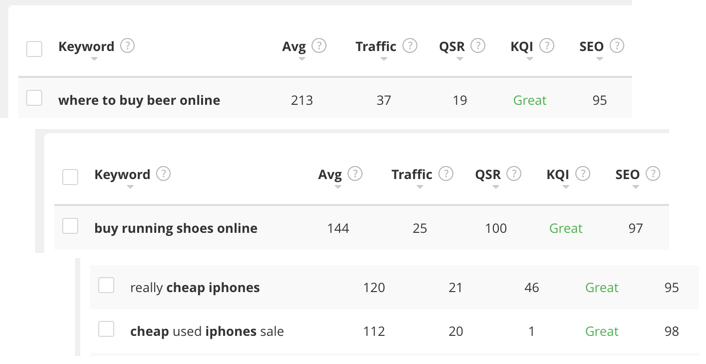
As you can see there are definitely some indicators that we should target these keywords, according to the tool. Your tool may show different results for these particular searches, but no doubt you’ll run into false positives no matter what tool you use.
Anyway, what we’re looking at in the screenshot above are some decent-looking phrases to target. There’s some traffic. Competition is low-medium. Why not write an article? Here are some creative titles you could squeeze these keywords into:
- Is You Cheap iPhone Stolen Or Fake?
- 10 Places To Buy Beer Online
- Should You Buy Running Shoes Online Or In Person?
Firstly, look at the intent of the search though. When someone types cheap iphones online, are they looking to read a 2,000 word post about real vs fake iPhones? Unlikely. They just want to look at some product listings. When someone searches buy beer online do they want to look at a list of websites? Not exactly. They want to see some places to buy beer. Basically, these people are looking for ecommerce style websites and product listings.
Well, that’s exactly what Google serves up.
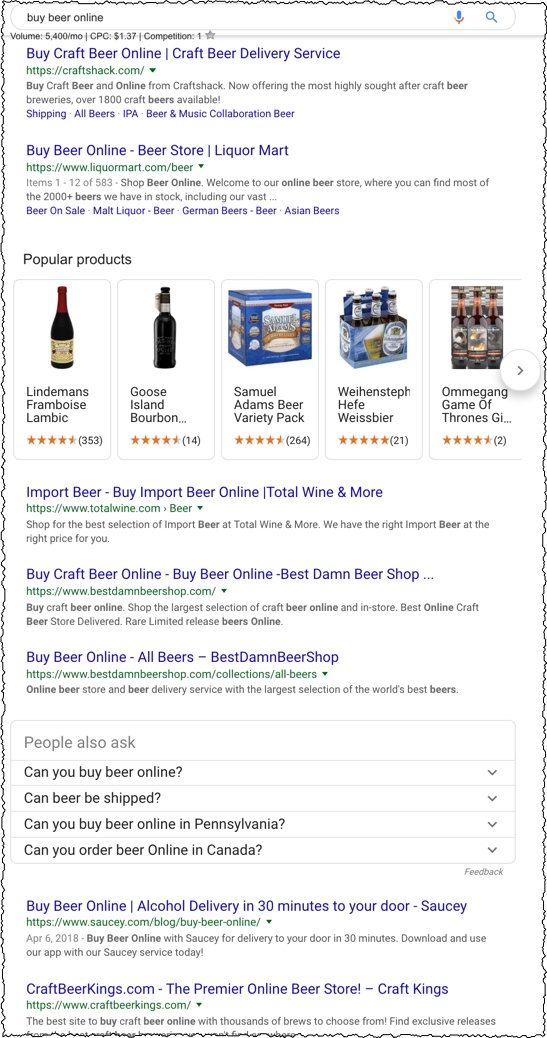
The entirety of page 1 is ecommerce listings. They are stores which actually sell beer. Let’s take this as a hint that Google isn’t interested in listing your blog post with a top 10 list of the best places to buy beer.
Let’s change up our search phrase though, and check the results. Before you see those results, I’ll let you know that I worked backwards to come up with this phrase. I thought to myself, what phrase would someone use if they were interested in seeing a list of beer-selling websites rather than just looking to purchase beer online?
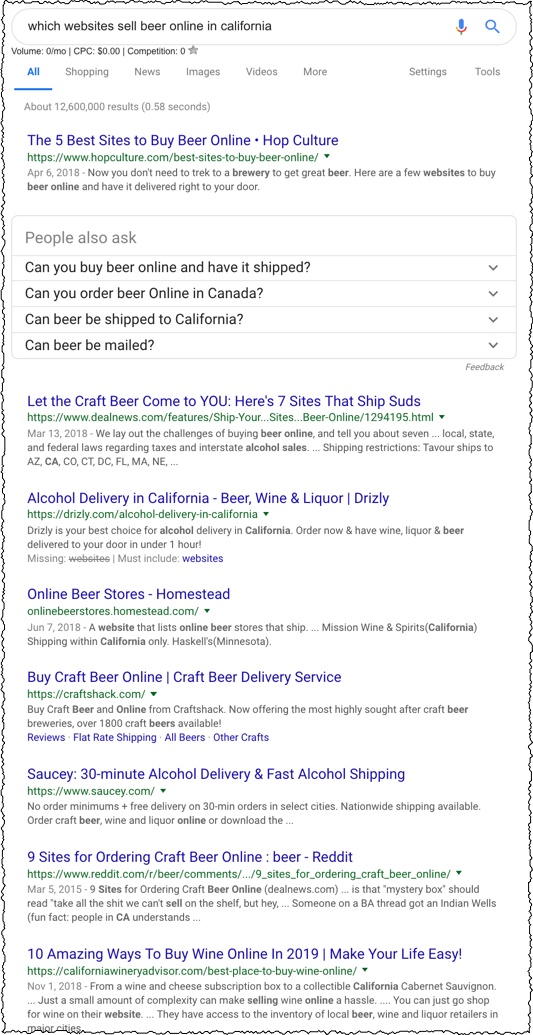
These results are more favorable to bloggers like yourself. Result #1 is a Top 5 list of websites. Perfect! Lower down, we have drizley.com, which does sell beer in California, but it’s a blog post that’s ranked, not their product listing. Lower down we have a reddit post, and a wine blog, both of which you have a good chance of outranking.
Looking back at our search phrase, the results are different because the intent has changed. Instead of just looking to get some beer, I’m looking to see what websites sell it in my area. I’m looking for information instead of products.
You can do the same with ‘cheap’ keywords. For example, I searched for “are cheap iphone cables bad”, and turned up a bunch of blogs. Yes, “cheap iphone” is part of your search, but the overall intent has changed from sourcing a product to buy, and looking for information.
You should definitely still target these information style keywords because they are opportunities to link to money pages. If you rank your blog post about cheap iPhone chargers being dangerous for official Apple products, you could like to an affiliate listing of real Apple phone chargers and other accessories.
Brand Leveraging
I totally understand the appeal of sneaking your way onto page one. Actually, a story I rarely tell is that one of my first successful websites was brand leveraging. I found a Clickbank product about ankle rehab at home, bought a .info domain name, then worked my butt off to rank it on page 1. I was something like spot #3 or #4 for the main product keyword, and made some consistent sales (nothing too crazy).
However, those days are pretty much over, so I recommend not trying to rank for brand keywords without adding some specific type of value. Here’s what I mean (and again, it relates back to search intent).
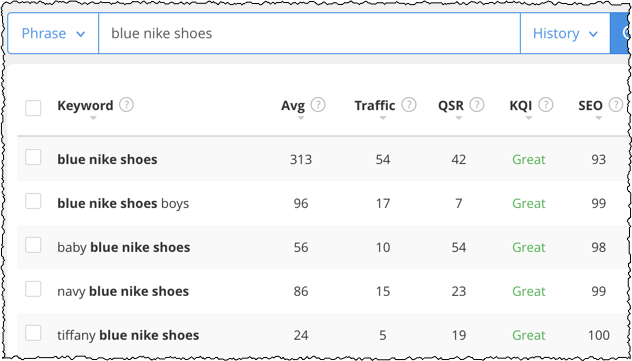
You can see that there’s search interest for blue Nike shoes. In fact, there are some really niche keywords like tiffany, baby, and navy blue shoes. A search in Google for any of these phrases turns up exactly what we discussed above – ecommerce stores. In this case, it’s Amazon, Etsy, Nike, and even Macy’s.
It’s unlikely you could rank content for this phrase even though it seems low competition. Even as you go past page 1, onto page 2, the results are all ecommerce, even if they are not relevant at all to the search.
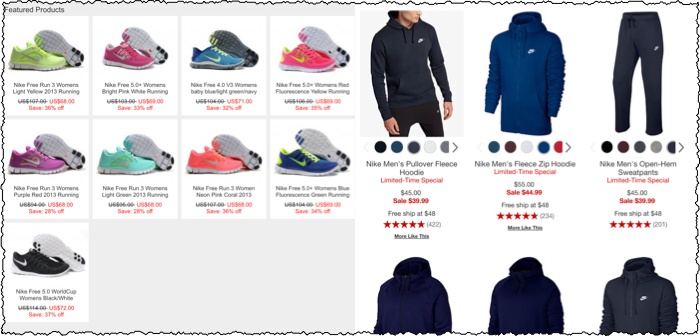
Plus, if you look to the end of the SERPs, you can see that there really isn’t that much competition. Only about 40 websites contain the phrase “blue nike shoes”. Despite the low competition, there are currently no blog-style websites ranked. It’s all ecommerce.
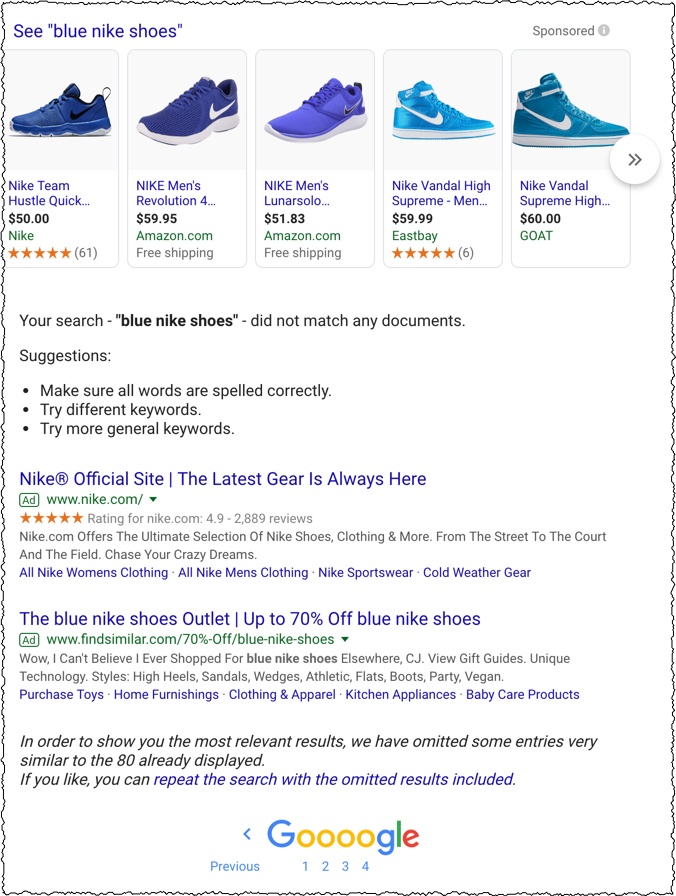
Sure. It’s POSSIBLE that you could write an extensive post on finding every type of blue Nike shoe imaginable. To improve your chances, the content could be about trying to find rare nike shoe colors like navy blue and Tiffany blue. It’s possible that you could write and rank a post like that. However, I think it’s unlikely to rank for keywords like I showed above, and probably not worth your time to write. You might get ranked for something different though, like “how to find rare colored Nike shoes”, or “what type of blue is available for Nike shoes” – something like that instead of just “blue Nike shoes”.
If you have a big passion for your topic, then go ahead! You might rank for something similar – an alternate, but more appropriate search term. Don’t let keyword metrics and probabilities stop you from writing what you think is interesting and useful. However, I see time and time again newbies trying to sneak their way to page one with useless content that just matches their keyword criteria, and Google is not having it.
Excessive Model Number Reviews
This one is a grey area, and I’ll explain why. At one point, I went though and purchased about 50 different versions of an item I was going to review. Models ranged in size, color, features, and styles. They were all pretty similar though.
I hunkered down and plowed through all 50 reviews. 2 years later, none of them rank well, and although they make some sales from time to time, the project has barely paid for itself. Not even close to being a “success”. All the rankings are general terms, not related to the models I was reviewing. For example, I’d write a post titled “Brand X Portable Heater Model #12345 Review”, but I’d just rank for “Brand X Portable Heater Review”.
Everything else was dominated by Amazon, Wayfair, Alibaba, and other product listings with the model numbers.
The impetus for the idea was that I could dominate search for super specific review keywords. Instead of going for iPhone X review, I’d go for Samsung Galaxy Model #12345 Review. Then I’d do:
- Samsung Galaxy Model #23456 Review
- Samsung Galaxy Model #34567 Review
- Samsung Galaxy Model #45678 Review
Well, the project didn’t work out. Yes, they do rank in a few places, and yes, they do make some sales. However, they do not rank well for my intended keywords! They rank based on the content I wrote. For example, if I said the Samsung Galaxy Model #45678 had problems while restarting, but was good because it came with the most default storage, then I would rank for terms like “Samsung Galaxy default storage best” or “Samsung Galaxy problems restarting”.
Though I don’t know for sure, I believe the key takeaway here is that we should be thinking about what value we’re providing to our readers. If smartphone #12345 only has a few slight variations from #23456, then it’s probably not worth writing separate reviews. You could knock out a post titled Smartphone #12345 vs. Smartphone #23456: Do You Really Need To Upgrade? or Should You Get The Smartphone #23456 If You Already Own The #12345?
The value there is going to be the comparison of the two models, and whether or not you should upgrade.
If there are large differences in the models, then yes, separate reviews could be useful. Just make sure you have enough to say without adding too much fluff! Otherwise, I’d stick to writing just one review. You can edit the URL to not contain the model number (before you publish), then you can just change the Title (h1) as upgrades are released, keeping most of the core content the same, but changing the necessary information to be up to date.
While we’re at it, adding colors or irrelevant features to your titles won’t get you any favor in Google either. Doing stuff like best pink iPhone case review or Chevy Colorado LT black review is not going to get you easy page 1 rankings.
Broad Concepts & Ideas
Here, we’re stepping into grey area. On the one side, I want to tell you that you should go for any phrase you think is important. I don’t care if it’s two words, very competitive, and you have no chance of ranking. Write it anyway, and do your best. You can still leverage the page as a linkable resource, get traffic from social media, and if it gets picked up by an authoritative site you stand a really good chance of ranking on page 1.
After all, I rank on page 1 for learn to make money online and learn make money online, so it does happen (although you could make the case that this is a long tail keyword, I still consider it a broad concept).
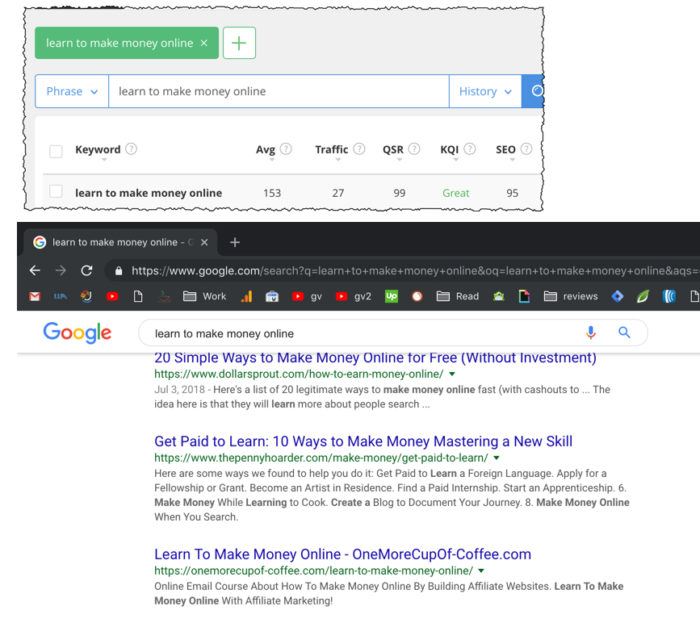
Avoiding broad concepts (when trying to rank) also goes for a lot of how-to style posts. “How To Build A Fence” is 5 words. That’s a longtail keyword, right? Maybe not. The indefinite article A is not really counted as a word since it doesn’t modify the meaning. “How to”, is two words, but it’s really just one, again, since it doesn’t change the meaning.
So the concept phrase you’re looking at here is actually “how build fence”, which is three words. Less than the recommended four-word minimum!
On top of that, it’s a very general idea. Does someone want to build a fence to replace one that’s falling down? Are they building their first fence? Is it a small fence for chickens? Is it a strong one to keep your large dog in an area of the yard? Wooden? Chain link? What’s your budget? There are a lot of unanswered questions from that title.
So in this case, I’d recommend picking out your audience and modifying the keyword to fit that purpose.
- How To Replace An Old Wooden Fence That’s Falling Down
- How To Build Your First 7-Foot Board-on-Board Fence
- How To Put Up A Chain Link Fence For Your Dog
- How To Build A Fence To Protect Your Backyard Chickens From Raccoons
Though writing such specific scenarios can be tedious, you can supplement your keyword research with topic research. Look at what topics are being discussed most, and how they are being talked about. Look at competition numbers. Maybe you can knock out 1200 words about building a chicken fence then embed a YouTube video, and you can rank on page 1 easily. The same may not be true of the chain link fence article, which may require more work, more instructions, and competition may be tougher.
More info in the Page 1 analysis section below.
Local Keywords (sometimes)
The jury is still kind of out on this one, but I figured I’d try to include it here just so you can keep an eye on it. I’ve experimented a few times, and haven’t seen very good results. I did some local restaurant reviews for a while, and they produced mixed results.
If I search for my exact phrase in the title, the reviews will turn up in spot 3 or after. Once I broaden the keywords a bit to not the exact phrase, they don’t even show up on page 1. It’s dominated by Trip Advisor, Yelp, and Facebook, sometime with multiple rankings!
Overall, this particular project wasn’t worth the time I spent on it, but there could be a better way to tackle this that I haven’t thought about yet. I’m not sure what exactly those keywords would look like – I just wanted to share my experience. Let me know in the comments if you find a way to leverage local keywords on a blog. I’m curious to see how you could use that to help local businesses rank their websites for relevant terms.
Find These Keywords (Matrix)
This particular tactic is great for creating infinite numbers of hyper-targeted content. It’s a bit tedious, and doesn’t work for all niches, but try find these style keywords related to your niche. I call it a “matrix” because that’s how you basically have to organize the keywords to make sure you don’t forget any.

- best shampoo for (oily, dry, brittle, fine, thick) hair
- best shampoo for (asians, blondes, african americans)
- best shampoo for (asians with oily hair, asians with brittle hair, asians with fine har, asians with thick hair)
Here’s another example: best (soy) protein for (bulking) (recovery), best (whey) protein for (cutting) (pre-workout meal), best (soy) protein for runners. See how you can mix and match all the descriptors for a different audience? A person who’s bulking (building muscle), but doesn’t want to eat too much soy will search terms like best soy-free protein for bulking, while a vegan bodybuilder will search for best non-whey-based protein for bulking. Similar products, but completely different audiences.
Different audiences means they need different content. That’s also good news for you because these will almost always be very targeted, low competition, but also low traffic, so most of the bigger sites will not hog page 1. They do stuff like “best protein supplements”, while you can find your own page 1 rankings with “best keto-friendly protein supplements for women”.
Extend Your Keywords
Short keywords are a problem, even if they are low competition. In the past couple years I found a bunch of new-ish, lesser-known products and wrote up reviews on them. I also invested a lot of time into doing “best” style keywords, like “best polarized sunglasses”. While sometimes those keywords work, in general, they are not a guaranteed page 1 ranking.
I have much better luck with keywords that contain four or more words.
It’s not always easy to find those type of phrases to write about, and the abundance of these types of keywords could depend on the niche you choose.
Why are 4-5 word phrases easier to rank than 2-3 word phrases? I’m guessing that it has something to do with the specificity of the search, but it also has to do with the level of competition. Even if there aren’t a ton of websites competing for a 2-3 word phrase, there are still some. You can bank on sites like Forbes, Cnet, Buzzfeed, Lifehacker, etc websites pumping out basic content like:
- best mens sunglasses
- best sous vide cooker
- best gate builder
- best homebrew kit
- best dog for kids
It’s easy to research, write, and publish content. With their site authority, they dominate page 1. That’s why you, as the expert, with specialized knowledge, have to go deeper with stuff like:
- best polarized swimming goggles for men
- best wifi-enabled sous vide immersion circulator
- best anti-sag gate building DIY kit
- best all grain IPA homebrew kit
- best small dog for kids with special needs
Finding Keywords Without Data
Sometimes, the best stuff to write about is what doesn’t turn up in a keyword tool. As I check in on my competitors from time to time, I can see that they are using some of the same keyword resources I am. The articles are different, but I can clearly identify the keywords they’re using…and it’s the same as my site!
Uh oh. How can I distinguish myself in a competitive market?
I like to get in tune with the world outside of the most popular keyword tools. If you chose a good niche, there will be communities built around the topic. Try Reddit, Pinterest, Twitter hashtags, Facebook groups, and forums.
It’s much more work to do the research, but you can get some serious insight into what type of content niche-enthusiasts want to read. Many topics will be super specific situations, like in a homebrew forum, someone could ask “what type of hops create a mango profile for an IPA recipe”. Wow, that’s a mouthful!
But do you know how I know that forum post exists? I asked that same question in Google, and the forum post turned up. So by my logic, if I asked this question just yesterday, and someone asked that same question several years ago, there are potentially hundreds of other people that also asked that question in those years between, and will continue to ask that question in the future.
Right now the forum is dominating and absorbing all that traffic, but you could absolutely create a more comprehensive resource and rank on page 1. Forums and social media are often full of incorrect opinions, unverified data, and unfinished thoughts. It’s a great opportunity for you to show your authority on the topic!
Here’s my process: after finding good topics, phrases, questions, or other keyword leads, I’ll check out stats in my keyword tool, just to see if there’s a way to optimize.
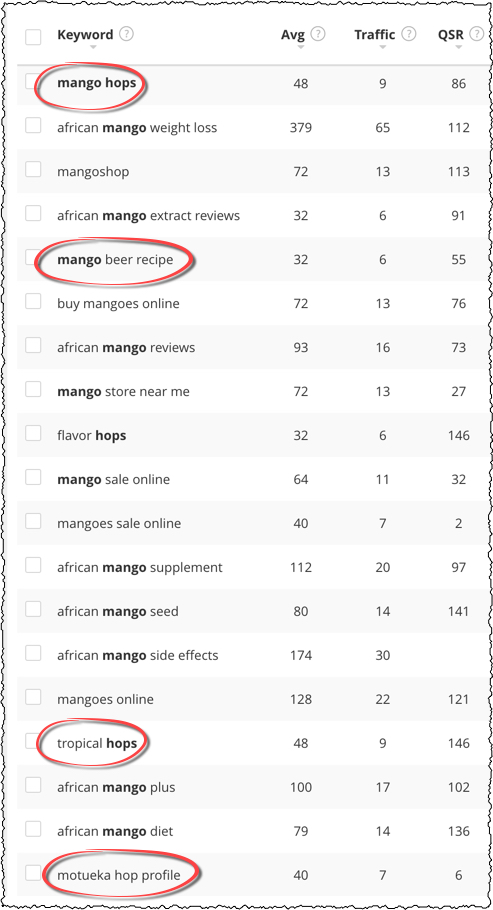
Here, I can see there are four more related keywords I can target for other content ideas. There’s not much available in terms of optimizing the “mango hops” search, so I would just write a post title as it comes to me naturally: Which Hops Have The Biggest Mango Flavor & Aroma or perhaps Which Hops Taste Like Mangos.
Sure, I don’t know if I’ll actually get traffic to the post, but with 1-2k words of content, there’s a good chance I’ll get ranked for something! Plus, either way, it’s a cool thing to write about, interesting to research, and will be a great resource to have on my site. Since I want to build an authority website, I need to take some risks, write some original content (outside of keyword stats), and holistically build out my online property.
I actually do know a lot about craft beer, and mango is one of the more popular flavors to taste, plus it’s easy to do. This is a good topic to write about for a homebrewing website!
PS. Amazon product questions are another great source for fishing out content ideas, and especially brainstorming content for Amazon affiliate product focused websites (something like bestcoffeegrinders.com).
Google Page 1 Competition Analysis
After all this research and work, we still have to look at Google to see what our competitors look like. First off, we are not going to be concerned with other bloggers like us. In fact, we HOPE to see them on page 1! That means Google is ranking blog-style websites, so we have a good chance.
Mostly what we’re concerned about is ultra-authoritative websites like Forbes, Buzzfeed, Tech Crunch, and Wikipedia. There are thousands more out there, but those are the four examples that popped into my head. Also, don’t forget to avoid the buy style keywords that rank mostly ecommerce websites that I mentioned above. Here’s a good example:
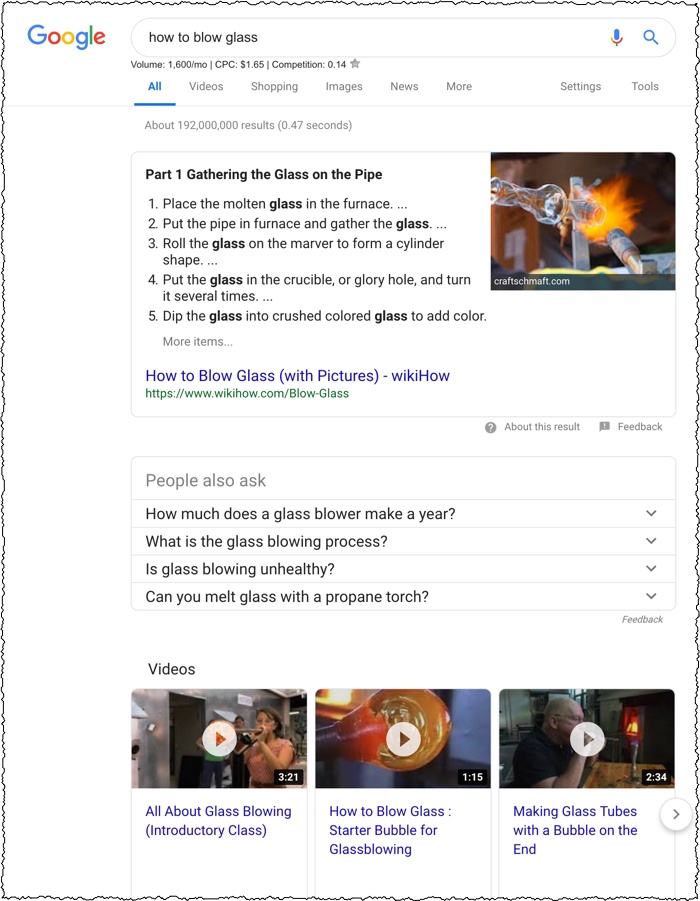
“How To Blow Glass” is DOMINATED by videos above the fold. You’d better have a video ready if you want any kind of attention for this phrase! As you scroll down, the results are a little better to look at.
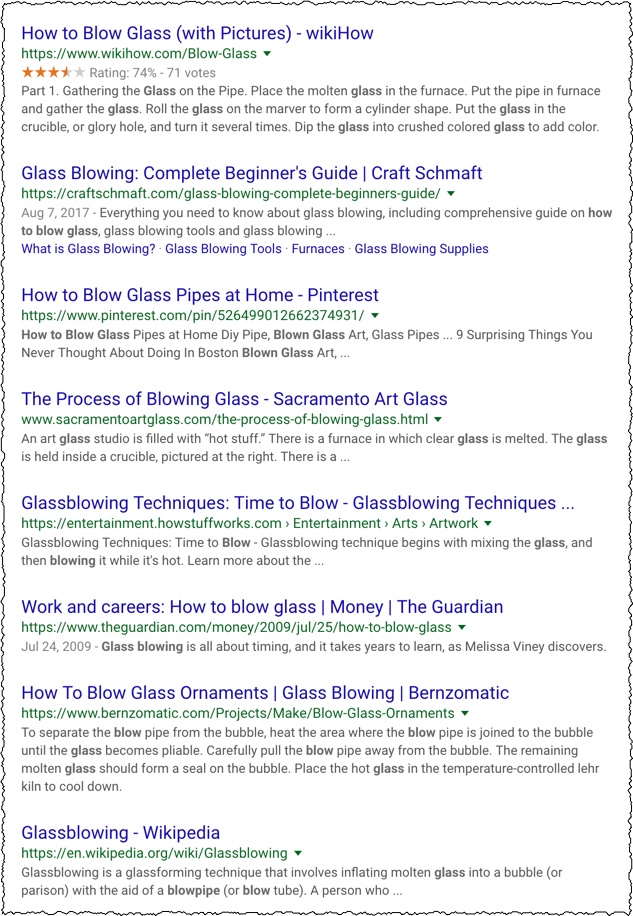
Websites I see listed are as follows:
- WikiHow
- CraftSchmaft.com
- SacramentoArtGlass.com
- HowStuffWorks.com
- The Guardian
- Bernzomatic.com
- Wikipedia
CraftSchmaft.com and SacramentoArtGlass.com are blog-style websites, that should be easy to compete with. Bernzomatic is a business website, and has garbage content. Just looking at results 1-10, it appears that you could rank on page 1, even above Wikipedia for a term like “how to blow glass”.
Actually getting clicks from it might be a different story because of all the videos and ads above the fold. This would not be an ideal keyword for me, but I would consider it. Perhaps I would take extra care to make this an awesome resource, and go all out with infographics, videos, images, and fully SEO’d text. After all, it’s a pretty broad concept (as discussed above).
I did notice that Google gave CraftSmaft.com jump-links results too. Don’t know what that is? Here’s a screenshot, and learn how to do jump-links for SERPs here.

Let’s try another search: best stand mixers for bread:
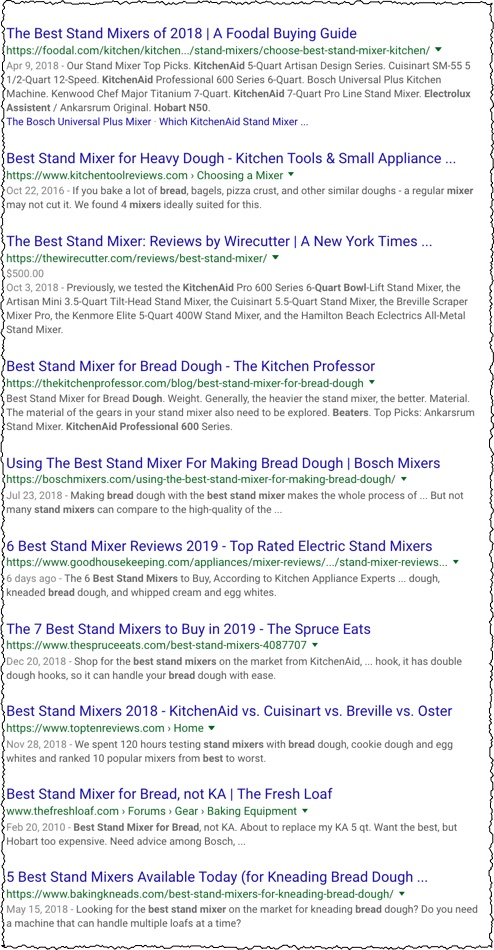
The sites I see in the top 10 are:
- Foodal.com
- KitchenToolReviews.com
- TheWireCutter.com
- TheKitchenProfessor.com
- BoschMixers.com
- GoodHouseKeeping.com
- TheSpruceEats.com
- Top10Reviews.com
- TheFreshLoaf.com
- BakingKneads.com
At least 50% of those results are individual bloggers, and you can see that KitchenToolReviews.com is very high up, and that site is clearly just a formulaic affiliate website. This is definitely a keyword worth pursuing.
One last example to show you what a more competitive environment looks like. I did a search for segway minipro 320 review.
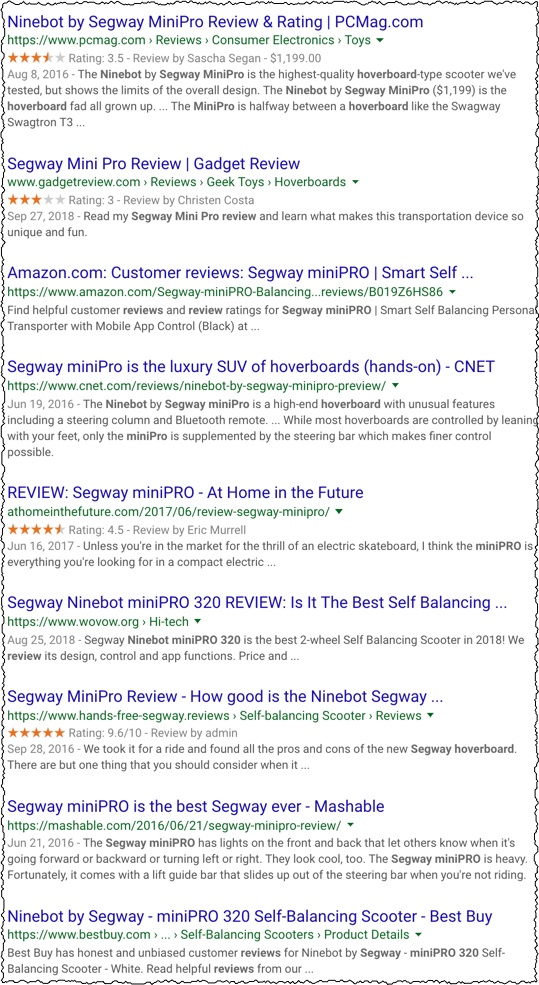
Here we see the websites:
- PCMag.com
- GadgetReview.com
- Amazon.com
- Cnet.com
- AtHomeInTheFuture.com
- Wovow.org
- Hands-Free-Segway-Reviews.reviews
- Mashable.com
- BestBuy.com
Actually, I was surprised by these results. I originally looked at this set of results and was convinced that it was too competitive. I assumed that GadgetReview.com and Wovow.org were both like Mashable.com or Cnet.com. It turns out, they are not great affiliate sites. I checked out their authority, links, and traffic stats with SEMrush. I wasn’t impressed! A really well done affiliate blog could easily beat them.
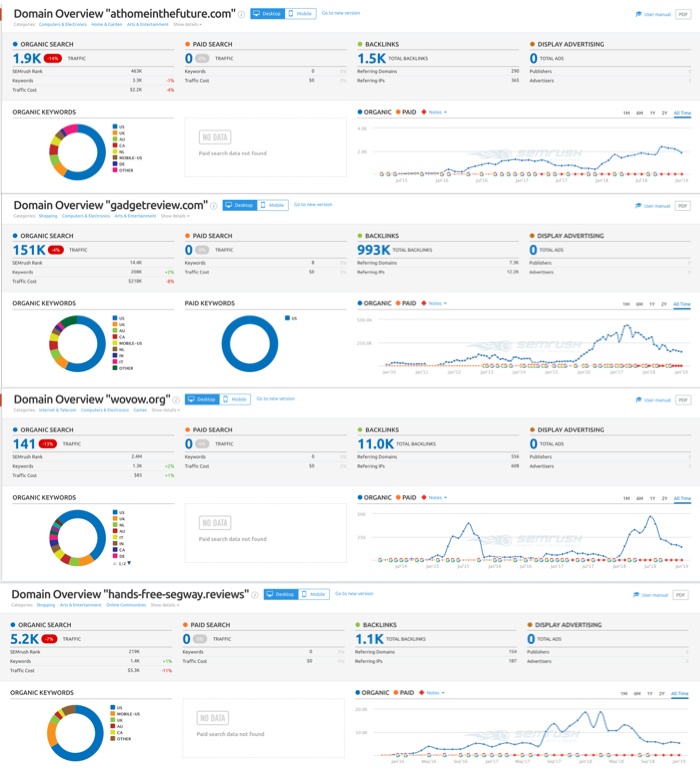
However, you still have Mashable, Best Buy, Amazon, Cnet, and PCMag to be concerned about.
Could you rank on page 1? Yes. It’s possible! It’ll be pretty hard though. Some search terms will be dominated by competitive domains, and in those instances, you need to narrow down your title to a more specific audience by extending your keywords (described in the section above).
Final Thoughts On Keywords For SEO, & Ranking
Keywords metrics are just a starting point when deciding what to write about on your affiliate niche websites. Good stats don’t guarantee rank. Doing your due diligence, knowing your niche, and having a passion for engaging with your audience all come into play when writing excellent content that people want to read, share, and click.
If you want to take your knowledge beyond the numbers, you can leverage the resources here on One More Cup of Coffee to learn how to write an excellent article, write a great product review, and generate hundreds of content ideas.
Alternatively, you can enroll in the same step-by-step affiliate marketing courses I took that taught me all this stuff. I wouldn’t be working from home full time as an affiliate marketer if it wasn’t for the training and guidance they provided! Plus, now that do this full time, I’ve become an affiliate of their product, and help my referrals on a daily basis to build out their own online businesses.

Nathaniell
What's up ladies and dudes! Great to finally meet you, and I hope you enjoyed this post. My name is Nathaniell and I'm the owner of One More Cup of Coffee. I started my first online business in 2010 promoting computer software and now I help newbies start their own businesses. Sign up for my #1 recommended training course and learn how to start your business for FREE!

 How Do I Delete a Post or Page Without Hurting My SEO?
How Do I Delete a Post or Page Without Hurting My SEO?
Favour
Thank you so much you have really lifted a lot of burden from me tonight. I have a 6 months old affiliate site no traffic, I just managed to sell some products and got approved from Amazon by God’s mercy and I have been wondering what could be the problem. Out of 35 posts only 2 is ranking, others are no where to be found. I have been searching all through internet looking for solution to no avail. You are a God sent. I will bookmark this and will always visit it till i become perfect like you. Indeed experienced is the best teacher. I think all you explained in this article is exactly what i’m going through. I will just see keyword and jump into it without knowing intent of the searcher. In fact I think i have to delete some posts after now or rewrite them with new url. God bless you.
Nathaniell
Thanks for reading Favour!